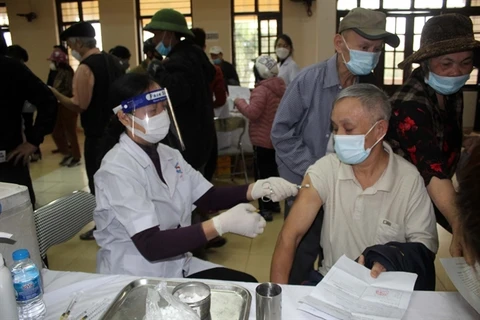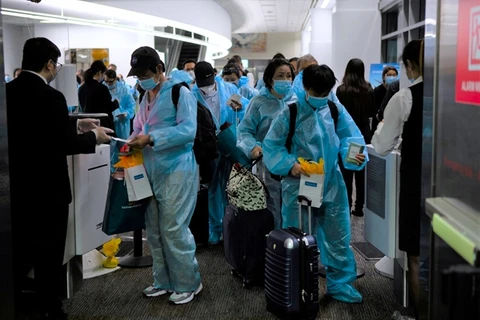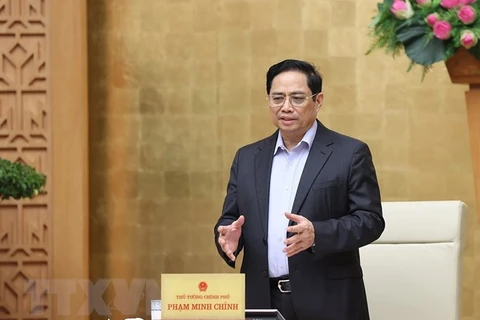Hanoi (VNA) - The Ministry of Health has proposed that all non-essential activities, entertainment and festive activities in localities with a high risk of COVID-19 resurgence be suspended during the upcoming Tet (Lunar New Year) holidays.
The ministry sent an official document to the Government regarding strengthening anti-pandemic measures during the country’s Lunar New Year period.
In the document, the ministry said many localities are still recording a large number of COVID-19 cases in the community, especially in localities with high population density, high rates of trade and travel activities.
In addition, the Omicron variant is spreading rapidly, with complicated and unpredictable developments in many countries around the world.
To ensure the effective prevention and control of the COVID-19 pandemic, the Ministry of Health proposed the Government consider stopping unnecessary gatherings of crowds, entertainment activities, festivals and religious activities in localities at risk of an outbreak during the Lunar New Year holiday.
Travel and trade activities during the Lunar New Year holiday must absolutely comply with the 5K message (masks, disinfection, no gatherings, medical declaration and distance) of the National Steering Committee for COVID-19 prevention and control, the document said.
Localities, based on the pandemic situation in their areas, will assess and update the pandemic level on the local portal and to the Ministry of Health to take up the anti-pandemic measures in the area according to Government's Resolution No. 128 on safe and flexible adaptation with the pandemic and Ministry of Health's Decision No. 4800 on COVID-19 guidelines.
In a separate move, the Ministry of Health also asked local administrations, Pasteur institutes, and the National Institute for Hygiene and Epidemiology to enhance surveillance for the Omicron variant.
All arrivals into the country since November 28, 2021, who have tested positive for coronavirus through the RT-PCR method or NAAT (Nucleic Acid Amplification Test) within 14 days of entry, will have their samples taken for genomic sequencing.
If the Omicron variant is detected, all close contacts of the infected will also be tested and all positive samples will be further analysed as well.
Health authorities must strengthen the surveillance system for cases with unusual developments and characteristics (number of cases, severe development or hospitalisation, or abnormal increase in mortality over time, geographical area, specific groups of people, etc.), and collect samples for screening and identification, to identify any Omicron transmissions.
All genetic sequencing results must be uploaded onto the Global Science Initiative and Primary Source (GISAID), which is a platform to share genetic data of influenza virus and SARS-CoV-2.
Localities have also been told to immediately administer the COVID-19 vaccines they have been allocated to boost vaccine coverage, with attention on the unvaccinated or partially vaccinated in their jurisdictions, as well as providing booster shots for priority groups (old people, people with chronic health issues, and immunocompromised conditions).
From the beginning of the fourth outbreak to December 17, the country recorded over 1.5 million cases of COVID-19, of which nearly 1.1 million patients were declared all-clear and more than 29,000 died. The number of community cases and deaths continue to increase rapidly in many localities.
Over the past week, Vietna has recorded about 15,000 new COVID-19 cases a day, including 9,000-10,000 community cases.
According to the Ministry of Health, the Omicron variant has appeared on four continents. At least 77 countries and territories have confirmed cases of Omicron.
According to the World Health Organization, Omicron is worrisome because it increases the chance of reinfection, it can evade immunity systems, and it spreads 3.2 times faster than the Delta strain. However, there is no evidence that the Omicron variant reduces the effectiveness of the COVID-19 vaccine, nor is there evidence of increased morbidity and mortality./.
The ministry sent an official document to the Government regarding strengthening anti-pandemic measures during the country’s Lunar New Year period.
In the document, the ministry said many localities are still recording a large number of COVID-19 cases in the community, especially in localities with high population density, high rates of trade and travel activities.
In addition, the Omicron variant is spreading rapidly, with complicated and unpredictable developments in many countries around the world.
To ensure the effective prevention and control of the COVID-19 pandemic, the Ministry of Health proposed the Government consider stopping unnecessary gatherings of crowds, entertainment activities, festivals and religious activities in localities at risk of an outbreak during the Lunar New Year holiday.
Travel and trade activities during the Lunar New Year holiday must absolutely comply with the 5K message (masks, disinfection, no gatherings, medical declaration and distance) of the National Steering Committee for COVID-19 prevention and control, the document said.
Localities, based on the pandemic situation in their areas, will assess and update the pandemic level on the local portal and to the Ministry of Health to take up the anti-pandemic measures in the area according to Government's Resolution No. 128 on safe and flexible adaptation with the pandemic and Ministry of Health's Decision No. 4800 on COVID-19 guidelines.
In a separate move, the Ministry of Health also asked local administrations, Pasteur institutes, and the National Institute for Hygiene and Epidemiology to enhance surveillance for the Omicron variant.
All arrivals into the country since November 28, 2021, who have tested positive for coronavirus through the RT-PCR method or NAAT (Nucleic Acid Amplification Test) within 14 days of entry, will have their samples taken for genomic sequencing.
If the Omicron variant is detected, all close contacts of the infected will also be tested and all positive samples will be further analysed as well.
Health authorities must strengthen the surveillance system for cases with unusual developments and characteristics (number of cases, severe development or hospitalisation, or abnormal increase in mortality over time, geographical area, specific groups of people, etc.), and collect samples for screening and identification, to identify any Omicron transmissions.
All genetic sequencing results must be uploaded onto the Global Science Initiative and Primary Source (GISAID), which is a platform to share genetic data of influenza virus and SARS-CoV-2.
Localities have also been told to immediately administer the COVID-19 vaccines they have been allocated to boost vaccine coverage, with attention on the unvaccinated or partially vaccinated in their jurisdictions, as well as providing booster shots for priority groups (old people, people with chronic health issues, and immunocompromised conditions).
From the beginning of the fourth outbreak to December 17, the country recorded over 1.5 million cases of COVID-19, of which nearly 1.1 million patients were declared all-clear and more than 29,000 died. The number of community cases and deaths continue to increase rapidly in many localities.
Over the past week, Vietna has recorded about 15,000 new COVID-19 cases a day, including 9,000-10,000 community cases.
According to the Ministry of Health, the Omicron variant has appeared on four continents. At least 77 countries and territories have confirmed cases of Omicron.
According to the World Health Organization, Omicron is worrisome because it increases the chance of reinfection, it can evade immunity systems, and it spreads 3.2 times faster than the Delta strain. However, there is no evidence that the Omicron variant reduces the effectiveness of the COVID-19 vaccine, nor is there evidence of increased morbidity and mortality./.
VNA

























